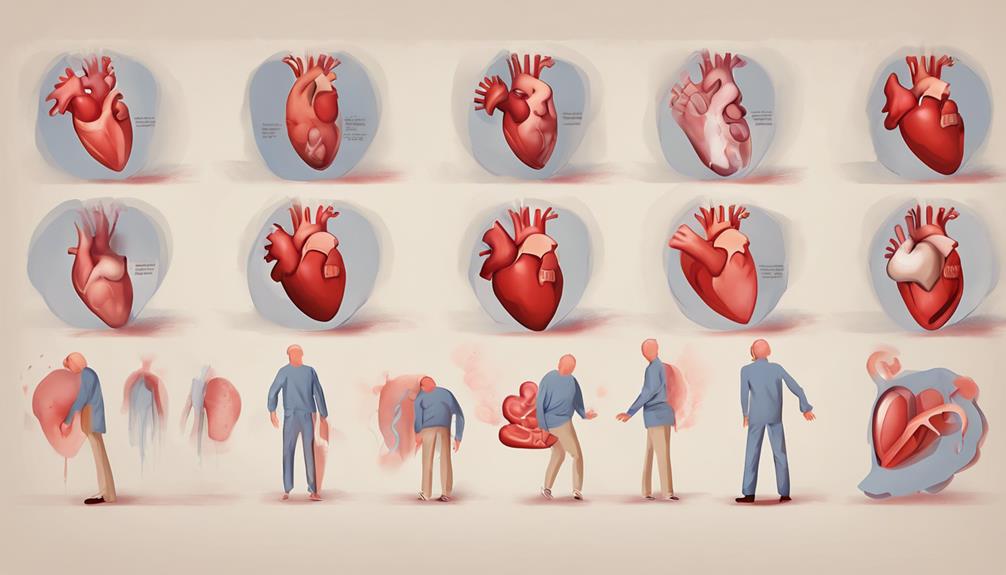Summary
Curious about the heart failure? It's about your heart's struggle to pump blood efficiently, not a complete shutdown. Symptoms include. fatigue, shortness of breath and fluid accumulation, but don't worry, your heart is not giving up completely. Systolic heart failure is due to weak heart muscle, while diastolic heart failure involves stiffness of the heart muscle. Knowing the type is critical for a personalized treatment. Understanding this condition helps to manage it effectively. Want to learn more about heart failure?
Definition of Heart Failure

Heart failure, also known as congestive heart failure, occurs when the heart is unable to pump blood efficiently throughout the body. This can lead to fluid buildup in the lungs, abdomen or other parts of the body, causing symptoms such as shortness of breath, fatigue and swelling in the legs. It is important to understand that heart failure does not mean that the heart has stopped working, but rather that it is not working as well as it should.
There are two main types of heart failure: systolic and diastolic. Systolic heart failure occurs when the heart muscle becomes weak and cannot pump blood effectively, while diastolic heart failure occurs when the heart muscle becomes stiff and does not fill enough blood between beats. Both types can lead to similar symptoms and complications, so it is important to work closely with your doctor to effectively manage the condition. Remember, early diagnosis and appropriate treatment can greatly improve your quality of life.
Types of Heart Failure
In the case of heart failure, it is essential to understand the different types for a effective management Of your condition. There are two main types of heart failure: systolic heart failure and diastolic heart failure. Systolic heart failure occurs when the heart muscle weakens and does not contract effectively, leading to a reduced blood emission from the heart. On the other hand, diastolic heart failure occurs when the heart muscle becomes rigid and does not relax properly, impairing the heart's ability to fill with blood between beats.
Understanding the type of heart failure you have is essential as it guides decisions to treatment and help health care providers develop a plan that meets your specific needs. Your health team will perform tests to determine what type of heart failure you are experiencing. By identifying whether your heart's main problem is contraction or relaxation, they can recommend the most appropriate medications, the lifestyle changes and therapies to effectively manage your condition. Remember, knowledge is power in the management of heart failure.
Common symptoms of heart failure

Recognizing the signs of heart failure can play a key role in effectively managing your health. Common symptoms of heart failure often include shortness of breath, especially during physical activity or when lying down; persistent coughing or wheezing; fatigue and weakness; swelling in the legs, ankles or abdomen; rapid or irregular heartbeat; reduced exercise capacity; and sudden weight gain due to water retention. These symptoms may vary from person to person and may develop gradually or suddenly. It is essential to pay attention to these signs as they may indicate worsening heart function and the need for medical intervention. If you experience any of these symptoms, especially if they interfere with your daily activities or worsen over time, seek medical advice promptly. Early detection and management of heart failure symptoms can lead to better outcomes and improved quality of life. Remain vigilant and communicate openly with your health care provider about any changes or concerns you may have about your heart health.
Causes and Risk Factors
Understand what leads to the heart failure and factors that increase risk is essential to take proactive measures for heart health. Heart failure can be caused by various conditions that weaken or damage the heart, such as the coronary artery disease, hypertension, diabetes and heart attacks. Other factors that may contribute to heart failure include obesity, smoking, excessive alcohol consumption, and a sedentary lifestyle. Genetics may also play a role, as some heart conditions may be hereditary, increasing the risk of heart failure.
Risk factors for heart failure include age, with older adults being more susceptible, as well as history of heart attacks, heart defects present at birth, and a family history of heart failure. In addition, conditions such as diabetes, hypertension, obesity, and sleep apnea can increase risk. Addressing these risk factors through lifestyle changes, monitoring underlying health conditions and seeking medical advice, you can reduce your chances of developing heart failure and improve your overall heart health.
Management of Heart Failure.

Effectively managing heart failure involves a holistic approach that includes lifestyle modifications, medication adherence, and regular medical monitoring. Making these changes can help improve quality of life and reduce the risk of complications. Here are some key strategies for managing heart failure:
| Management Strategies | Description |
|---|---|
| Adherence to Drug Therapy | Take prescribed medications regularly and as directed by your doctor. Skipping doses can make your condition worse. |
| Healthy Diet | Follow a low-sodium diet to reduce fluid retention and control blood pressure. Include plenty of fruits, vegetables and whole grains. |
| Regular Exercise | Practice physical activity as recommended by your doctor to strengthen the heart and improve circulation. |
| Weight Monitoring | Weigh yourself daily and report any sudden weight gain to the health care team, as it could be a sign of fluid accumulation. |
| Stress Management | Find healthy ways to cope with stress, such as relaxation techniques or talking to a psychologist. Stress can worsen the symptoms of heart failure. |
Frequently asked questions
Can heart failure be prevented?
You can take measures to prevent theheart failure maintaining one healthy lifestyle. Eating a balanced diet, staying active, managing stress, and avoiding smoking are all key factors. Regular checkups with your doctor can help detect any problems early. Remember, small changes can go a long way toward keeping your heart healthy and reducing your risk of heart failure.
What are the long-term effects of heart failure?
The long-term effects of heart failure can vary. Complications such as kidney damage, irregular heartbeats, and reduced quality of life are common. You might experience Dyspnea, fatigue and swelling in the legs. It is essential to follow the treatment plan, including medication, lifestyle changes and regular checks. By managing your condition, you can improve your symptoms, slow the progression of the disease, and improve your overall well-being.
Are there alternative treatments for heart failure?
If you are curious about alternative treatments for heart failure, there are some options to explore. Lifestyle changes such as a heart-healthy diet and regular exercise can be beneficial. In addition, complementary therapies such as acupuncture or relaxation techniques can help manage symptoms. It is important to consult your doctor to investigate what alternative treatments might be appropriate for your specific situation.
How does heart failure affect mental health?
When dealing with theheart failure, its own mental health can be greatly affected. The stress and uncertainty associated with this condition can lead to anxiety, depression, and feelings of isolation. Symptoms such as fatigue and difficulty breathing can also affect emotional well-being. It is important to seek support from loved ones, health professionals, and care providers to address these challenges. Prioritize theself-care and managing stress can help improve one's mental health while coping with heart failure.
Can heart failure be hereditary?
Yes, theheart failure can be hereditary. If close family members such as parents or siblings have had heart failure, your risk may be higher. Genetics may play a role in certain types of heart failure. While lifestyle factors also contribute, it is important to be aware of your family history and discuss any concerns with your health care provider. Understanding your genetic risk can help you effectively manage your heart health.
